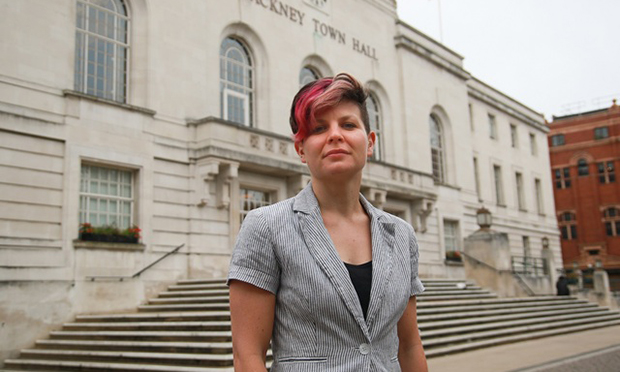Hackney mayoral candidate wants to abolish ‘disruptive’ mayoralty and focus on ‘respecting residents’

Green Party mayoral candidate Zoë Garbett. Photograph: Hackney Greens
The upcoming by-election could be the last time Hackney voters choose a mayor – if Green candidate Zoë Garbett gets her way.
Garbett is running for the top political job in the borough for the second time, but if one of her key policies wins approval, she could put herself out of a job.
“We support calls to abolish the role of directly elected mayor,” she told the Citizen.
“This by-election shows how disruptive it is. If we had a system with a leader working with councillors instead of a mayor, we would not need an election now.”
Garbett took second place last year to Labour’s Philip Glanville, whose resignation has triggered the 9 November by-election. However, she was elected as a Dalston ward councillor and has spent her time learning as much as she can about how the council works.
She has pledged to hold Citizens’ Assemblies to give residents a stronger voice if she becomes Hackney’s new mayor.
“It’s about respecting residents and making them part of the discussion,” she said.
The recent consultation about closing some primary schools because of falling school rolls highlights her concerns.
“Parents know the challenges schools are facing. Bring parents in earlier to discuss the problem,” she said.
“I feel that if they had been brought along, you would not have a situation where people feel that things are done to them.
“It’s about seeing people as equals and partners.”
She also pointed to the work of Morning Lane People’s Space campaigners, who had more than 1,000 responses from residents about the future of the Tesco site in Hackney town centre, as an example of effective listening.
Garbett has promised to hold the police to account after the Child Q scandal, where a Black teenager was strip-searched by police at her school, and damning reports of prejudice in the Metropolitan Police.
“We want the same things: for people to be safe and happy,” she said.
If she becomes mayor, her first job on day one will be looking at the budget.
The council is currently facing a £13m overspend this financial year, with pressures including rising costs for services.
Hackney Council, like many other local authorities, may have to make further savings to balance the books, after years of cuts in government funding.
Garbett said: “It is going to be a really tough year for the council.”
Her other priorities include tackling the housing crisis and repairing the council homes.
“Three out of every four people who come to my ward surgeries have overcrowding issues, or are trying to move home, or have problems with their homes.”
She wants to promote council support for those in the private rented sector.
“People are sometimes terrified to ask for something to be fixed.”
She does not agree with the council’s current policy of building new homes in partnership with private developers, which means a proportion are sold on the open market.
“I would like to look at alternative solutions, like borrowing or alternative funding, and making sure we do not demolish social homes.”
Garbett wants the climate emergency to be a priority “in absolutely every decision”.
She would like to extend controversial low traffic neighbourhoods, where some roads are closed to motor vehicles driving through.
But she said the scheme needs more consultation and to be part of a wider picture, with more efficient public transport and better green alternatives so people feel safe ditching their cars.
“It’s about listening to people about solutions,” she said.
Garbett is also a candidate in next year’s Mayor of London election and is passionate about tackling the climate emergency and inequalities.
Hackney’s mayoral by-election takes place on Thursday 9 November.
It was called after Labour mayor Philip Glanville quit over his association with former councillor Tom Dewey.
The candidates standing are: Zoë Garbett, Green; Caroline Woodley, Labour; Peter Smorthit, Independent; Simon de Deney, Liberal Democrat; Simche Steinberger, Conservatives; and Annoesjka Valent, Trade Unionist and Socialist Coalition.

Can Garbett please define what she means by climate emergency in the context of a London Borough and provide some projected or recorded data on how much of an impact her policy proposals will have on the greenhouse effect please?
H2O is the biggest contributor to providing the planet with a hospitable temperate environment. Methane (CH4) is a short-lived hydrocarbon and perhaps an indicator of life (see Mars and Titan) but perhaps is detrimental in the short term on Earth. CO2 likewise at 0.04% by composition (currently) is useful for plant life (C4 and C6 krebs cycles) and botanic species have evolved alongside fluctuations in the history of evolution over far longer time scales than the aribitary 1850 datum she is talking about.
Is proof of biotic elements in oil proof of keritanisation? How does this theory square with deep sea hydrothermal vents? There are many questions about the science of hydrocarbons that are fascinating, has she read Thomas Gould? (The deep hot biosphere).
In terms of citizens assemblies does she mean scientific ones or religious groups? Does she intend these assembelies to solely concentrate on her personal views?